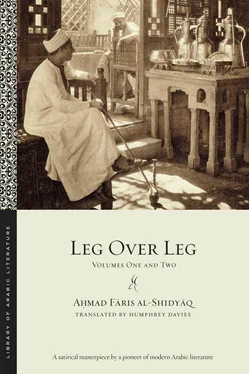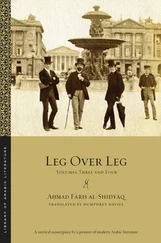Al-Shidyāq was unhappy in Malta. In Leg over Leg he calls it as “the Island of Scoundrels” ( Jazīrat al-mulūṭ , a word-play with the root letters of Malta) and “the Island of the Foul of Breath” (an allusion to the Maltese language, which he sometimes referred to as a corrupt version of Arabic). In his Travel Narrative of the Known Conditions of Malta he found fault with almost every aspect of Maltese culture and geography, describing the climate as so inhospitable that vegetables, even when grown abroad, lose their taste when eaten there. 18He likewise bristled under missionary life: he could not tolerate the missionaries’ food or austere lifestyle — he visited taverns, to the missionaries’ chagrin, and was rumored to have had “conversation with bad women” 19—and wished to be more fairly compensated for his work.
Yet his years in Malta also gave him his first opportunity to work in print, allowing him to develop skills and interests in many aspects of the printing process, all of which would allow him to hold editorial and managing positions in Arabic presses throughout the region. In Egypt, where he traveled when he left CMS employ between 1828 and 1834, he worked on the editorial staff of the first Arabic periodical, Al-Waqāʾiʿ al-Miṣriyyah ( Egyptian Events ), and he would later found his own journal and printing press in Istanbul. Little is known about his life in Egypt, except that he seemed dissatisfied with his government position — he approached the missionaries in 1829 to return to Malta, and in 1832 was employed as an Arabic instructor in a missionary school. When his replacement translator left to participate in an expedition to the Euphrates, he returned to Malta and resumed his former post, remaining there from the end of 1834 until the press closed in 1842.
When al-Shidyāq finally left CMS employ, it was to complete a translation of the Bible under the auspices of the Society for Promoting Christian Knowledge (SPCK), another Anglican mission organization operating in Malta. In 1845, this brought al-Shidyāq to the small village of Barley, in Hertfordshire, and then (after a brief return to Malta) to Cambridge, in order to work with Professor Reverend Samuel Lee (d. 1852), an Orientalist and missionary. After Lee’s death, al-Shidyāq continued to work on the Bible, while living alternately in London and Paris until its publication in 1857. This was the first of his periods of great literary productivity, enabled by the steady salary he received from the SPCK (and supplemented by a job as the commercial correspondent for the trading company of Butrus Ḥawwā, to whom he dedicates Leg over Leg ). 20In England, he lived near the Cambridge University Library and the British Museum and their substantial Arabic manuscript holdings — he was impressed by the access readers were granted to rare and important manuscripts — and came into contact with scholars of Arabic literature there and in Paris (including Thomas Jarrett at Cambridge, John Nicholson at Oxford, and Caussin de Perceval in Paris). In Paris he also met Arab litterateurs and reformers on their travels (including Fransīs Fatḥallah Marrāsh and Khayr al-Dīn al-Tūnusī). It was in this atmosphere of intellectual stimulation (as opposed to the “Panegyricon,” or “praise factory,” of the Egyptian press office) that al-Shidyāq wrote and published Leg over Leg (at the Paris press of Benjamin Duprat, in 1855) and began his travel narratives of Malta and Europe and several other minor projects, including a French grammar for Arabic students and an Arabic grammar for English students.
Although he worked with Protestant missionaries for nearly half of his career, he rigorously maintained an independent-minded scholarly agenda. While translating texts in Malta, he held a post as lecturer in Arabic at the university in Valletta. In Egypt, while working for Muḥammad ʿAlī’s state-run newspaper and then a CMS-run school, he began to attend Muslim scholarly and literary circles, studying jurisprudence, grammar, and literature with al-Azhar shaykhs, as well as acquiring or copying “as many classical texts as he could find.” 21Later, when he moved to England in order to collaborate on a translation of the Bible, he not only copied manuscripts of some of the most important works produced during the golden age of Islam but also began to compose a refutation of the Gospels. 22That is, during the same years that al-Shidyāq worked to establish a faithful and correct translation of the Bible, in accordance with the Hebrew and Syriac source texts, he was also working on a treatise arguing for the unreliability of the Gospels on the very basis of source criticism. In this treatise, al-Shidyāq presents the contradictions of source criticism and faith as irresolvable — a gesture that perhaps most concretely points to his own resolute skepticism that remained the basis of his literary and scholarly endeavors, whether he worked under Christian or under Ottoman Muslim patronage, which he did after leaving Europe in 1857.
The year 1857 marks al-Shidyāq’s final departure from missionary employment (though it may be argued that the true break came in 1855, with the publication of his scathing depiction of the missionaries in Leg over Leg ). In 1842, while in Malta, he had written a poem in praise of the ruler of Tunis, Aḥmad Bāy, and had received a diamond in recognition of it. Later, in Paris, on one of the Bāy’s journeys there, al-Shidyāq wrote another laudatory poem; this one elicited an invitation from the Bāy to Tunis to establish a state printing press and newspaper. While this project was eventually realized by one of his contemporaries, al-Shidyāq remained in Tunis for nearly two years, where he continued to work on his European travelogue, Uncovering the Hidden Arts of Europe (published in Tunis in 1863). Scholars believe that it was here that he converted to Islam, taking the name Aḥmad — though evidence in Al-Sāq seems to point to his having converted even earlier, while still in Europe. 23
Soon afterward, he was invited by the Sublime Porte to the capital, and it was there, as Aḥmad Fāris al-Shidyāq, that he would attain the greatest recognition. He arrived in Istanbul/Constantinople in 1859, where he was first employed as chief corrector at the imperial press, and, in 1861, he became the founder and editor in chief of Al-Jawāʾib ( Tidings from Afar ), the first Arabic periodical to be published there and perhaps the most influential Arabic publication to be produced in the Nahḍah. Al-Jawāʾib ran weekly from 1861 to 1883, and for the first nine years it was subsidized by the imperial ministry of finance and printed at the government press. 24Thus beholden, as were most other periodicals of the time, to “our master, the great sultan,” as al-Shidyāq puts it, Al-Jawāʾib reproduced government bulletins and produced news reports that corresponded with official accounts of events and yet maintained a partial independence, for which it was occasionally punished. 25More than merely a mouthpiece for the Ottoman sultan and his provincial governors, Al-Jawāʾib was also a source for domestic and international news and might have been best known as a venue for cultural and literary debates. A lover and defender of the Arabic language, al-Shidyāq used Al-Jawāʾib as a vehicle for his philological scholarship and as a place where he could hold fierce linguistic debates with his contemporaries and publish poems satirizing his critics. He engaged in international debates about Arabic usage with the editors of the Paris journal Birjīs Bārīs ( The Paris Jupiter , 1858–63) and an intergenerational argument about orthography with Ibrāhīm al-Yāzijī and the editors of Al-Jinān in Beirut. These were so heated as to inspire a critic to launch a periodical devoted entirely to satirizing al-Shidyāq, Rujūm wa-ghassāq ilā Fāris al-Shidyāq ( Fire and Brimstone upon Fāris al-Shidyāq , 1868); it only lasted a few issues.
Читать дальше












